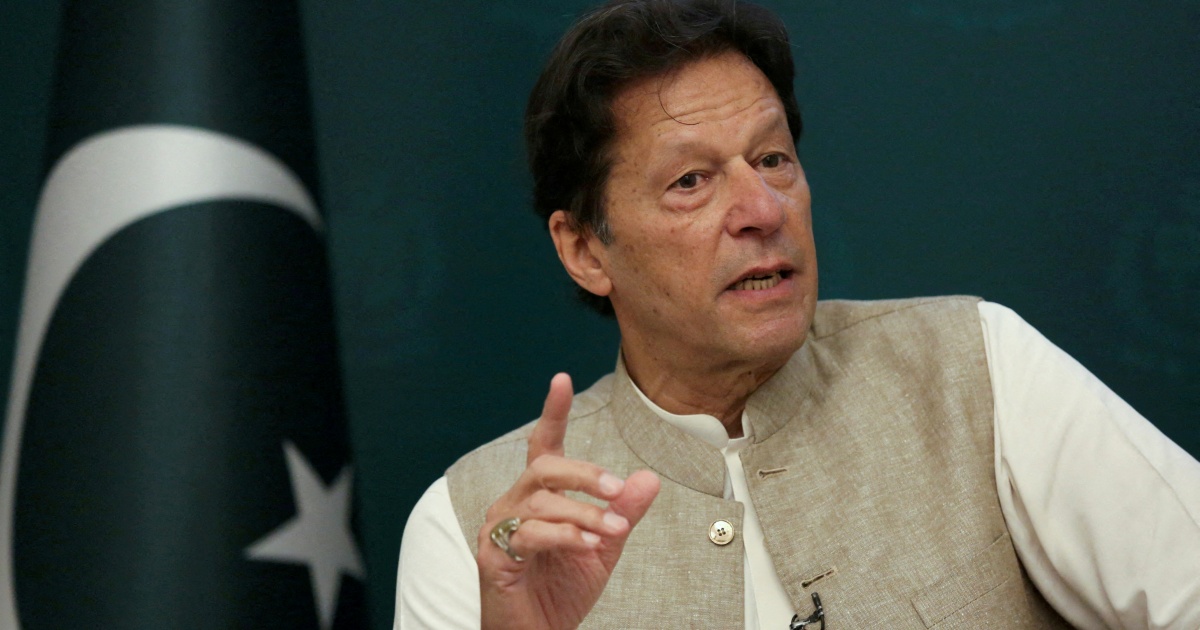REGIME CHANGE COMPLICATES PAK ARMY’S TASK

Imran Khan, voted out as Pakistan’s Prime Minister earlier this month, has scaled down his rhetoric, suggesting that if not a ‘conspiracy’ by the United States, it was ‘interference’ that led to his exit.
He appears to have grudgingly opted to fall in line with the much-vaunted ‘establishment’ that he had defied, seeking to make peace with the institution that oversees the way the country’s polity functions.
His poser at the Saturday rally of his party workers in Karachi obviously came after the army came out in the open through a media conference addressed by Major General Babar Iftekhar, Director General, ISPR. The officer specifically ‘urged’ Khan to desist from repeating the conspiracy charge in public.
Gen. Iftikhar issued several disclaimers, including one about the army being not just ‘neutral’, but also ‘apolitical’, playing no role in the country’s political affairs and swearing support to the “democratic institutions.”
By firmly denying that there was a conspiracy to oust Khan, whether by the United States, the Army, or both, he has put all stakeholders on the alert. He attempted to clear the choked diplomatic channels with the US, the biggest benefactor of Pakistan and of the army itself.
He also spoke for his Chief, General Qamar Javed Bajwa, whose three-year extension ends in November, saying that he (Bajwa) never ‘sought’ further extension (from Khan) and “even if offered” (by the Shehbaz Sharif Government), “will not accept it”.
This clears the choked channels among the top military brass, nursing legitimate concerns that a second unprecedented extension would have placed Bajwa in the top job for nearly nine years, thus blocking promotion chances of others.
The army resorted to this extraordinary measure, analysts say, as part of a damage control exercise and to recover the predominance of its own role in the national affairs. There have been considerable attacks on the army, with even the top brass named from the political pulpit, at first in the last quarter of 2020, when three-time Prime Minister Nawaz Sharif led a frontal attack from his London exile and again, as the political shenanigans gained momentum this year.
Looking back, the military, called ‘establishment’, had a tough time dividing the Pakistan Democratic Movement (PDM). Imran Khan’s handling had proved to be the army’s Achilles heel then. This year, with Imran less willing to listen, even getting defiant, the army chose to “go neutral.”
Quick to discern the ‘signal’ after Khan and Bajwa disagreed over posting of Lt. Gen. Faiz Hameed, Khan’s alleged ‘favourite’ within the army, for the opposition to sink differences and unite, Khan’s allies in the government to desert and over a dozen ruling party lawmakers in rebellion, ready to cross sides.
The military would have been uncomfortable with Khan’s defiance and abusing legal and constitutional processes meant to vote him out, till the top judiciary stepped in to apply the corrective. By hindsight, the unstated truth, only obliquely hinted, is that this saved Pakistan, and the army itself, from direct intervention, as had happened three times before.
However, the regime change has changed little in Pakistan’s troubled polity. If at all, it has complicated the army’s task.
Its experiment to bypass the mainstream parties headed by two families, tried and tested before and found wanting and corrupt, and promote Imran Khan, a non-dynast with no political roots and experience, has failed. It must now find those who stay within its parameter. The army must have found, yet again, that politics and politicians are unpredictable.
It is unlikely to trust Khan, but cannot write him off. He enjoys supporters among the young and the middle class. Some sections in many cities have protested his ouster. Emotions run high as of now. Khan would want to have early elections while this support stays and the new rulers are left with no time to perform.
The army must plan its strategy as politicians are preparing for the elections. If he can help, Bajwa must oversee them and come November, leave in glory.
The army has noted that the PPP is not joining the government, leaving the difficult task of governing to the PML (N). The economic situation is grim and the rising prices have triggered much public discontent. Sharif and his party, who have regained control of the key Punjab province, would not like to play the fall guy.
As elections come, the PML (N) and the PPP that governs in Sindh are bound to turn adversaries to retain their respective turf and expand on them. The same goes for Maulana Fazlur Rahman’s Islamist party that has been close to the ‘establishment’ and would like to benefit.
As Najam Sethi writes in the Friday Times (April 26, 2022): “The current regime led by the PDM is thus in the grip of two opposing tensions. If it opts for early elections, it might face a fair challenge from Imran Khan because his supporters are still kicking dust. If it delays the polls but is unable to deliver and is discredited, it will revive his option.”
With willing supporters in all camps, the army has many choices, but also the dilemma of who, or which combination to choose, for an unpredictable exercise that must end in retaining control and initiative. (Ends)






